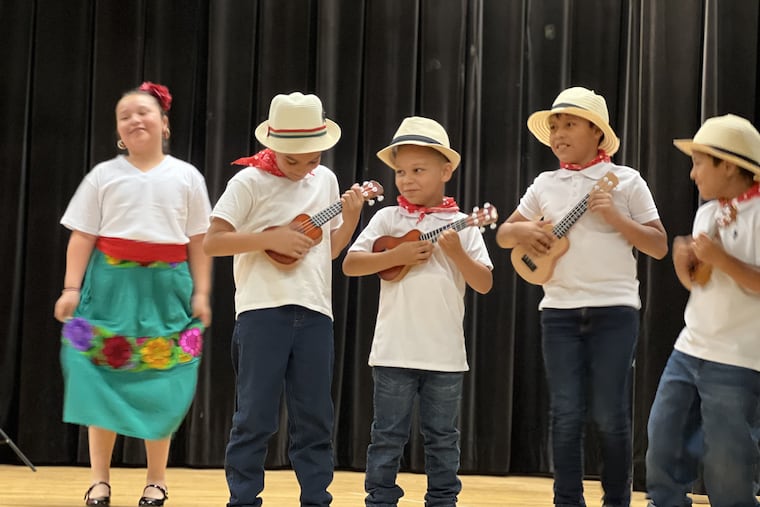N.J. schools could be required to teach Hispanic and Latino history
A 2023 study that analyzed how Latinos are depicted in U.S. history books found them lacking in authenticity. Key topics were not covered or mentioned in five sentences or less in 87% of the books.

Under a bill pending in the state Legislature, New Jersey public schools would be required to teach students about the history of Hispanics and Latinos and the contributions they have made.
State Senate Majority Leader Teresa Ruiz (D., Essex) sponsored the measure, which would mandate the instruction in social studies class for all students in kindergarten through 12th grade. As a youngster, Ruiz said, she learned about her Puerto Rican heritage at home, but her lessons in school were lacking.
“When I was being taught those phases of American history, it was as if we were never there,” Ruiz said. “We made contributions in very significant ways.”
Ruiz said she wants teachers “to tell the American story inclusive of everyone who contributed to it.” New Jersey has a rapidly growing Hispanic and Latino population, accounting for about 22% of the state’s 1.1 million residents, U.S. Census figures show.
“It’s a wonderful opportunity to have students connect to their culture,” said Yasmín E. Hernández-Manno, president/executive director of the New Jersey Association of Latino Administrators and Superintendents. “It will only enhance the learning of youngsters.
Hernández-Manno, who is of Cuban descent, said she would like to see the course be offered year-round, and in Spanish, not restricted to Hispanic Heritage Month, an annual celebration that ended Tuesday to recognize the achievements, histories, and traditions of Hispanic and Latino Americans.
“It’s well needed. A lot of students can identify and aspire to those types of leadership roles,” she said.
» READ MORE: Cherry Hill School District becomes first in N.J. to mandate African American history course for graduation
In the Camden school district, where Hispanic and Latino students make up 54% of the 5,900 students enrolled, Superintendent Katrina T. McCombs in 2023 added Latin American studies as a graduate requirement, beginning with the Class of 2027. It previously was an elective but now is a 2.5-credit semester course.
» READ MORE: One of a handful in the region, Camden district is offering Mandarin Chinese with plans to grow the program
“We do have a story to tell,” said Genaro Borrero, a bilingual social studies teacher at Camden’s Eastside High School. “It would be a great history to understand.”
Borrero said Hispanic and Latino history is often taught beginning with the Spanish colonization of the Americas. Often excluded are significant moments such as the Mexican-American War and the Spanish-American War and prominent figures like labor leaders and activists Dolores Huerta and Cesar Chavez, he said.
Borrero said expanding the curriculum as a state mandate would help him delve further into the various cultures and events. His students hail from Mexico, Guatemala, Haiti, Brazil, and Chile. Some speak Spanish, others Haitian Creole.
“It helps continue the melting pot that was the original idea of America,” Borrero said.
Making the history course a mandate statewide is “an amazing idea,” said Damian Irizarry, 17, a senior at Charles Brimm Medical Arts High School in Camden. He was not required to take the Latin American studies course, but believes it will help bridge racial divides.
“It’s just a great opportunity for students to learn not just the traditional history that we learn,” said Irizarry.
Eric Fieldman, a veteran social studies teacher at Collingswood High School, said he infuses Latino and Hispanic history into his lessons to include topics such as the Zoot Suit Riots that erupted in Los Angeles in 1943 after a group of U.S. servicemen and off-duty police officers clashed with young Latinos. The violent clashes took their name from the baggy suits young people of color wore during that era.
“Representation is so important for the students to see themselves in the history and their contributions,” Fieldman said. “We have to really show people the real version of history and not just the whitewashed version.”
Fieldman said he culls together his own resources for his classes on history and social justice because, he said, “finding anything in the history books is really impossible,” a problem also cited by Ruiz.
» READ MORE: Asian American and Pacific Islander history could be mandatory in N.J. school curriculum
A 2023 study by Johns Hopkins University that analyzed how Latinos are depicted in U.S. history books found the texts lacking in authenticity. Key topics in Latino history were either not covered or only mentioned in five sentences or fewer in 87% of the books examined, the study found.
The appointment of Supreme Court Justice Sonia M. Sotomayor in 2009 was often cited as the most significant Hispanic breakthrough moment of the last 200 years, the study found.
The bill sponsored by Ruiz would require the state Department of Education to provide districts with sample learning activities and resources. The instruction would become part of New Jersey’s learning standards.
The Senate Budget and Appropriations Committee advanced the bill, 13-0, out of committee to send it to the full Senate. An identical Assembly version, A387, is pending before its Education Committee.
» READ MORE: LGBTQ education is now mandatory in N.J. schools. Here’s how teachers are preparing.
New Jersey previously adopted laws requiring public schools to incorporate African American and Asian American and Pacific Islander history into K-12 social studies lessons; teach about the Holocaust and genocide; and include instruction about the contributions of lesbian, gay, bisexual, and transgender people.